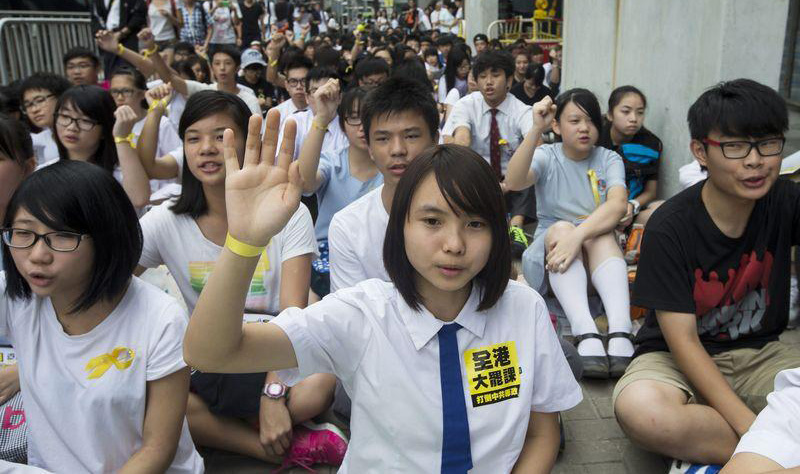Hong Kong: Hong Kong pupils made human chains at schools early Monday and protesters disrupted rush-hour trains as the city’s pro-democracy movement returned to action after a weekend which brought some of the worst violence in three months of anti-government protests.
The global financial hub is in the grip of an unprecedented crisis as a largely leaderless movement has drawn millions on to the streets to protest against what they see as an erosion of freedoms and increasing interference in their affairs by Beijing.
China, which stands behind Hong Kong’s government, has reacted with intimidation, including pressure on the city’s businesses and well-publicised troop movements and exercises near the border.
An editorial late Sunday in ‘Xinhua’, the state news agency, warned ‘the end is coming’ for the protest movement, without giving further details.
Early Monday protesters dressed in their signature black stood at doorways of trains, stopping them from closing, at a series of stations on the underground system, briefly disrupting an arterial network that has become a target of their activities.
Shortly afterwards, secondary school pupils formed human chains outside a number of government schools before classes began.
Some wore gas masks, helmets and goggles – the now essential kit carried by protesters during months of tear gas-enveloped rallies and clashes with police.
At one school the bronze statue of Sun Yat-sen, the Hong Kong-educated powerhouse of Chinese political thought, was also fitted with a gas mask and goggles. A few dozen pupils risked disciplinary action at school to attend a rally in the city centre.
“Hong Kong is our home… we are the future of the city and have to take up responsibility to save it,” said a 17-year-old secondary school student who gave her surname as Wong.
Hong Kong is a semi-autonomous southern Chinese city that operates under a ‘one country, two systems’ framework, which gives citizens rights unseen on the mainland. China committed to giving the people of Hong Kong those rights in an agreement which saw the city return from British colonial rule in 1997.
China’s erosions of those rights has been one of the driving forces behind the protest movement.
Another 17-year-old pupil named Cheung recognised the importance of study but reasoned ‘if a city no longer has freedom, we can’t speak our own views. Then academic achievement is not important.”
The protests started in opposition to government plans to allow the extradition to the mainland of people wanted by Beijing, but have widened to include broader demands.
These include demands for the extradition bill to be formally scrapped and for an independent inquiry into alleged police brutality during the protests.
The protesters also want the city’s leader and all its lawmakers to be directly elected, scrapping the current system that heavily favours the Chinese government.
AFP
